I. BEGINNING THE LETTER
Thanking (благодарность) :
Thanks (a lot/so much) for your (long) letter, (Спасибо (большое) за твое (длинное) письмо)
Many thanks for…, (Большое спасибо за…)
Thanks for sending me… (Спасибо за то что прислал/а мне …)
I was awfully glad to get your letter! (Я страшно обрадовал/ся/ась получить твое письмо)
It was great / lovely to hear from you (again)! (Было здорово/мило получить о тебе весточку (снова)!
It was great to get your letter… (Было замечательно получить твое письмо)
It was really great to hear all your news, after not hearing from you for ages… (Это было действительно классно узнать все твои новости, после того как от тебя не было весточки целую вечность)
Thanks a lot for your invitation. I’d love to come… (Большое спасибо за твое приглашение, я с удовольствием приеду)
Thanks very much for inviting me to your birthday party. I am really looking forward to seeing you soon! (Спасибо за приглашение на твой день рождения, я жду с нетерпением нашей встречи!)
I was really excited when I got your invitation. Unfortunately, I’ve realized it’s the same weekend as my cousin’s wedding, so I won’t be able to make it. (Я был/а очень рад/а получить твое приглашение. К сожалению, Я понял/а что дата совпадает со свадьбой моего двоюродного брата, поэтому не получится.)
Apologizing (извинение) :
I know I haven’t written to you for a long time, sorry. I was very busy preparing for … (любой глагол с окончанием ING) (Я знаю, что не писал/а тебе очень долго, извини. Я был/а очень занята подготовкой к…)
I’m sorry I haven’t answered earlier but I was really busy with my schoolwork. (Извини, что не отвечал/а раньше но я был/а действительно занята моей учебой)
I must apologize for not writing…, (Я должен/на извиниться, что не писал/а …)
I really should have written sooner….(Мне действительно стоило написать раньше)
Sorry I haven’t written for so long but… (Извини, что я не писала так долго, но…)
Sorry I couldn’t write earlier I was… (Извини, я не мог/ла написать раньше, я был/а…)
I’m very/really/terribly/awfully sorry about not replying to your letter sooner but I’ve been extremely busy. (Я очень извиняюсь за то, что не отвечал/а на твое письмо раньше, но я был/а ужасно занята)
Sorry for not writing earlier but I’ve been preparing for my exams really hard. So, wish me luck! (Извини, что не написал/а раньше, но я готовил/ся/ась очень усердно к моим экзаменам. Поэтому пожелай мне удачи! )
How are things with you? I’m sorry I haven’t written for so long, but … (Как твои дела? Извини, что так долго не писал/а, но…)
Reference to the previous contact (ссылка на информацию в предыдущих письмах):
I am glad that you have done so well. (have + любой глагол в 3 форме. используем в случае, если хотим отреагировать на последние новости друга ) (Я рад/рада, что ты (сделала что-то) так хорошо )
I’m glad you passed your History test! (Я рад/а, что ты сдал/а тест по истории!)
Sounds like you had a great time in London! (Похоже ты отлично провела время в Лондоне!)
Great news about your … ! (Отличные новости о твоем…)
I was really pleased to hear that…. (Я был/а действительно счастлив/а узнать, что)
I thought I’d better write and tell you about … / drop you a line to let you know… … (Я подумал/а, что лучше написать тебе и рассказать о… / черкнуть тебе строчку, чтобы сообщить, что …)
II. MAIN BODY OF THE LETTER:
Referring to the friend’s questions in the previous letter (ссылка на вопросы друга в предыдущем письме) :
You asked me in your letter what…/where … / (NB! Grammar: Reported speech) (Ты спрашивал/а меня в своем письме что/где … )
You said in your letter that you are thinking of taking a gap year (Ты сказал/а в своем письме о том, что думаешь по поводу промежуточного года между школой и поступлением в ВУЗ )
Last time you wrote you asked me what sports our school had (NB! Согласование времен в английском) (В прошлый раз ты писал/а мне и спрашивал/а какие виды спорта популярны в нашей школе)
I was sorry to hear that… (Я расстроился/ась, узнав что…)
Cheer up! Don’t worry too much! (Приободрись! Не волнуйся слишком много!)
Don’t let it get you down! (Не позволяй этому выбить тебя из колеи!)
Useful linking words and phrases:
You know, … (Знаешь ли, …)
By the way, … (Кстати, …)
Actually, … (Вообще-то, …)
So, … (Итак, …)
Luckily, … (К счастью, …)
Unluckily, … (К несчастью, …)
Anyway, … (Во всяком случае, …)
Predictably, … (Как и ожидалось, …)
Well, … (Ну,…)
As for (the weather), … (Что касается (погоды),)
Giving advice (даём совет, рекомендацию):
You should / shouldn’t do it. (Тебе следует / не следует сделать это)
Have you thought about + doing…/ going … (Ты задумывался/ась о том чтобы сделать…/поехать …)
Please take my advice don’t waste your time on… (Пожалуйста, последуй моему совету, не трать свое время на…)
Go and see the film «He is a dragon». you’ll be amazed! (Иди и посмотри фильм … Ты будешь удивлен/а.)
I would definitely recommend seeing/visiting/reading/having a look at… (Я бы точно порекомендовал/а …)
Why not give it a try? You’ve got nothing to lose! (Почему бы не попробывать, тебе нечего терять!)
If I were you, I’d do it. (На твоем месте я бы это сделал/а.)
If I were you, I wouldn’t do it as it can be too risky! (На твоем месте я бы этого не делала, так как это может быть слишком опасно.)
It seems to me that … (Мне кажется что…)
I hope my advice helps (Надеюсь мой совет поможет)
I hope that everything will turn all right (Надеюсь, что все будет хорошо.)
Asking for advice (Просим совет):
Can you give me your advice? (Можешь посоветовать мне?)
Can you give me some advice?
Please let me know what you think I should do. (Пожалуйста, скажи)
Making a request (выражаем просьбу) :
I was wondering if you happened to know … (Мне интересно знаешь ли ты …)
Commenting critically(выражаем критику):
I find/ something rather bizarre/absurd/incomprehensible (Я нахожу что-то довольно странным/абсурдным/непонятным…)
A particular strength/weakness is (Особенное достоинство/недостаток это …)
III. CONCLUSION OF THE LETTER:
Why you have to finish your letter (объяснение причины, почему тебе нужно завершать письмо) :
I think, that‘s all my news for the moment. (Думаю, это все мои новости сейчас.)
That’s all my news for now… (Пока это все мои новости.)
Well, that’s all for now.(Ну, на этом пока все.)
Well, I’d better go now as I have to do my homework. (Ну, мне лучше идти, потому что мне нужно сделать мою домашнюю работу).
Anyway, I have to go now because my Mum asked me to help her with the washing up. (В любом случае, мне нужно идти, потому что мама попросила меня помочь ей со стиркой).
I’ve got to go now! It’s time for my favorite TV show. (Мне пора! Время для моей любимой передачи!)
Express your desire to keep in touch with your pen-friend (ссылка на последующие контакты) :
Write (back) soon! (Напиши скорее ответ!)
Do write soon and let me know what you’ve been doing. (Очень прошу напиши поскорее и дай мне знать, чем ты все это время занимал/ся/ась).
Take care and keep in touch! (Береги себя и будь на связи!)
Drop me a letter when you can. (Черкни мне письмо, когда сможешь.)
Hope to hear from you soon. (Надеюсь вскоре о тебе услышать.)
Looking forward to seeing you. (С нетерпением жду встречи с тобой.)
I can’t wait to hear from you! (Не могу дождаться услышать весточку от тебя!)
I’ll write again soon. (Я обещаю написать снова скоро!)
Write to me and tell me your plans. (Напиши мне и сообщи свои планы.)
Please write to me again soon, and tell me all your news. (Пожалуйста, напиши мне вскоре и расскажи свои новости.)
Please give/send my regards (love) to your… (Пожалуйста, передай мой привет (мою любовь) твоим… )
If you want to know anything else, just drop me a line. (Если ты хочешь узнать что-то еще, просто черкни мне пару строк.)
Well, that’s all for now. Do write back soon. (Ну, это все сейчас. Пожалуйста, напиши ответ скорее.)
Inviting (приглашение)
I would really like you to visit me this summer. (Я бы очень хотел/а чтобы ты навестил/а меня этим летом.)
I would really love to see you. Why don’t you come and visit me this… (Я бы с радостью тебя увидела. Почему бы тебе не приехать и не навестить меня этим…)
How about meeting up for going to the cinema some time? (Как насчет того, чтобы как-нибудь сходить в кино?)
ENDING (Заключительная фраза) :
Love,
Lots of love,
All mу love,
All the best,
Best wishes,
Kind wishes,
With best wishes,
Yours,
ВЫПОЛНИТЕ ТЕСТ: С1 Informal Letter Vocabulary Bank Test
Нам бывает непросто выразить свои мысли лаконично и связно, когда мы общаемся на английском, пишем электронные письма по работе, отправляем сообщения иностранным друзьям. Сегодня расскажем, какие связующие выражения и вводные слова можно использовать, чтобы сделать вашу речь красивой, понятной и логичной.
Что такое linking words
Для начала нужно разобраться, что такое linking words и зачем их нужно знать.
Linking words — это связующие элементы, которые употребляют для логического перехода от одной мысли к другой. Они сделают вашу речь или письмо понятнее для англоговорящего читателя и обеспечат более высокий балл при сдаче любого экзамена. По-другому их называют discourse markers — маркеры беседы, связующие обороты речи.
Linking words могут быть выражены отдельными словами (например, however) или фразами (например, as a result), относиться к разным частям речи и употребляться в разных частях предложения.
| Часть речи | Слова-связки | Место в предложении | Пример |
|---|---|---|---|
| Союз | Like, because, although | В большинстве случаев ставятся в середине предложения, но могут быть и в начале, например although. | Although shopping online is quite cheap, delivery periods can be very long. — Несмотря на то, что покупать онлайн довольно дешево, сроки доставки могут быть очень долгими. |
| Предлог | Due to, despite the fact that, because | Ставятся перед существительными. | Young professionals are moving abroad because of low salaries in their native country. — Молодые специалисты переезжают за границу из-за низких зарплат в их родной стране. |
| Наречие | Therefore, indeed | Ставятся в начале предложения, выделяются запятыми. | The deadlines of the project are close. Therefore, we need to begin the launch of our product. — Сроки завершения проекта поджимают. Поэтому нам нужно запускать наш продукт. |
Linking words можно разделить на множество групп в зависимости от их функции (противопоставление, добавление новой информации, введение, заключение и т. д.). Давайте разберем каждую группу отдельно.
1. Purpose — цель написания
Эта группа наиболее важная, ведь в любой письменной работе мы указываем цель ее написания. Эссе, письмо другу или e-mail по работе — в большинстве случаев мы начинаем с объяснения, зачем мы пишем тот или иной текст. Например:
- in order to do smth, so as to do smth — чтобы сделать что-то;
- so that — чтобы;
- to that/this end — с этой целью.
I am writing to you so as to confirm my participation at the conference. — Я пишу вам, чтобы подтвердить свое участие в конференции.
I would like to confirm my participation at the conference so that there is no misunderstanding. — Я бы хотел подтвердить свое участие в конференции, чтобы не было недопонимания.
Zoologists are seeking to understand how animals communicate with each other. To that end, a new study has been launched. — Зоологи пытаются понять, как животные общаются друг с другом. С этой целью было начато новое исследование.
Хотите как можно скорее заговорить на английском? Тогда записывайтесь на бесплатный пробный урок.
2. Opinion and emphasizing — выражать мнение и акцентировать внимание
Это также одна из наиболее полезных групп linking words, так как во многих письменных заданиях необходимо выразить свое мнение по поводу той или иной идеи. Наиболее употребляемая фраза — in my opinion (по моему мнению). Как же можно заменить это выражение?
- in my view, to my mind, to my way of thinking — на мой взгляд, по моему мнению;
- personally, I believe that — лично я думаю, что;
- I feel strongly that — я глубоко убежден, что;
- I am inclined to believe that — я склонен полагать, что;
- it strikes me that, it seems to me that — мне кажется, что;
- as far as I am concerned — насколько мне известно.
To my way of thinking, in any occupation talent is more important than skills. — На мой взгляд, в любой профессии талант важнее умений.
I am inclined to believe that the problem of malnutrition in poor countries doesn’t depend on technological development. — Я склонен полагать, что проблема недоедания в бедных странах не зависит от развития технологий.
It strikes me that there is a larger issue in the team. — Мне кажется, что в команде есть еще более весомая проблема.
Иногда хочется подчеркнуть особую важность того или иного факта. Следующие слова помогут красочно, а главное, правильно это сделать:
- clearly, obviously — определенно, очевидно, бесспорно;
- needless to say — само собой разумеется;
- significantly, importantly — что особенно важно.
Clearly, if everyone were allowed to carry a gun, the crime rate would rise. — Бесспорно, если бы каждому было позволено носить оружие, уровень преступности возрос бы.
Importantly, the writer was being employed by the leading party when he wrote this work, and was therefore under pressure. — Что особенно важно, писатель работал на ведущую партию, когда написал данную работу, и поэтому был под давлением.
3. Listing facts and addition — перечисление фактов и добавление новой информации
В подтверждение вашему мнению зачастую необходимо привести ряд доказательств. Правильно и логично их выразить помогут следующие связующие слова и фразы, они всегда на письме выделяются запятой.
- firstly, first of all — во-первых;
- first — для начала;
- to start with, to begin with — прежде всего;
- in the first place — в первую очередь;
- secondly — во-вторых;
- thirdly — в-третьих;
- then, next — затем;
- afterwards, after that — после этого;
- finally — наконец;
- lastly — в заключение;
- last but not the least — последнее, но не менее важное.
To begin with, you should wash the wound in the cold water. Next, wrap a bandage around the cut. Lastly, put the patient in a comfortable position. — Прежде всего, вам следует промыть рану холодной водой. Затем обмотайте рану бинтом. В заключение, положите пациента в удобное положение.
Если вы хотите добавить какую-либо информацию к своему высказыванию, используйте подходящие слова-связки. Одна из типичных ошибок — это постоянное использование союза and (и) и also (также). В английском языке существует множество альтернативных слов и фраз:
- moreover, furthermore, in addition — более того (используются в начале предложения);
- besides — кроме того;
- as well as — так же, как и;
- coupled with — наряду с;
- not only … but also — не только …, а также и;
- not to mention, to say nothing of — не говоря уже о (используется, чтобы подчеркнуть новый аргумент);
- on top of that — сверх всего прочего, вдобавок ко всему;
- not only that, but — при этом.
That war caused suffering to millions of people worldwide, not to mention its impact on countries’ economy. — Эта война обрекла на страдания миллионы людей по всему миру, не говоря уже о ее влиянии на экономику стран.
The characters of the novel missed their train, and on top of that they were alone in the middle of nowhere. — Герои романа опоздали на поезд, и вдобавок ко всему они остались одни в глуши.
4. Contrast — противопоставление
Уметь правильно высказать противоположные мнения или факты также важно. Вместо обычного but (но) употребляйте следующие linking words:
- however — однако;
- on the one hand — с одной стороны;
- on the other hand — с другой стороны;
- having said that — вместе с тем, при этом;
- then again, that said — впрочем, хотя;
- yet — тем не менее (если стоит в начале предложения);
- despite smth, in spite of smth, notwithstanding smth — несмотря на что-либо;
- nonetheless, nevertheless — несмотря на это, все равно.
It is well known that the first landing on the Moon took place on July 20, 1969. Having said that, some people assert that it is a hoax. — Всем хорошо известно, что первая высадка на Луну была 20 июля 1969 года. При этом некоторые утверждают, что это ложь.
The manager says that a fire was the reason for what happened. Then again, it’s possible that he was paid to say this. — Менеджер утверждает, что причиной случившегося стал пожар. Впрочем, возможно, что ему заплатили, чтобы он так сказал.
Ann was not doing well in her physics course. Yet, she managed to get a high grade in the final exam. — Анна не очень хорошо училась по физике. Тем не менее ей удалось получить высокую оценку за итоговый экзамен.
Notwithstanding some members’ objections, the company went ahead with the plan. — Несмотря на возражения некоторых членов, компания продолжила идти по намеченному плану.
The research had its limitations, but it was important for us nevertheless. — В исследовании были свои ограничения, но оно все равно было важным для нас.
5. Comparing — сравнение
При сравнении двух точек зрения можно использовать следующие linking words:
- likewise, similarly — равно как и, таким же образом, аналогично;
- whereas — тогда как;
- conversely — и наоборот, в свою очередь;
- by contrast, in comparison — напротив, зато, в противоположность;
- although, even though — хотя;
- unlike — в отличие от.
Cars must stop at red traffic lights. Likewise, bicycles have to stop too. — Машины должна останавливаться на красный свет. Таким же образом должны поступать и велосипедисты.
People who aim to climb corporate ladders develop this trait while growing up. Conversely, people who search for stability acquire these values in their childhood. — Люди, которые стремятся идти по карьерной лестнице, приобретают эту черту характера пока взрослеют. В свою очередь, люди, которые ищут стабильность, получают эти ценности в детстве.
The marketing department suffers from absenteeism. By contrast, the call center employees are performing very well. — В отделе маркетинга наблюдается проблема отсутствия работников без уважительной причины. Зато сотрудники колл-центра работают очень хорошо.
The village festival went well, unlike the previous year when very few people came. — Сельский праздник прошел хорошо, в отличие от предыдущего года, когда собралось совсем мало людей.
6. Cause and consequence — причина и следствие
Важно уметь не только выражать свое мнение, но и аргументировать его. Многие изучающие английский язык делают ошибку, используя только because (потому что) и so (поэтому), тогда как существует множество синонимичных слов и фраз для выражения причин или следствий:
- Cause — причина
- since, as — так как;
- owing to the fact that, due to the fact that — в связи с тем, что;
- on the grounds that — исходя из того, что;
- in view of, in light of — принимая во внимание, исходя из;
- because of — из-за.
Since they had to wait for the train, they decided to have a cup of coffee. — Так как им нужно было ждать поезд, они решили выпить по чашке кофе.
Many members have objected to the proposal on the grounds that it would be too costly. — Многие члены не одобрили предложение исходя из того, что оно может быть слишком затратным.
In view of the late hour, the chairman decided to put off that discussion until the next meeting. — Принимая во внимание позднее время, председатель решил отложить обсуждение до следующего собрания. - Consequence — следствие
- consequently — следовательно;
- as a result — в результате этого;
- as a consequence — вследствие этого, как следствие;
- therefore — поэтому;
- for this reason — по этой причине, в силу вышесказанного;
- thus — так, таким образом.
Nowadays young adults receive a lot of help from their parents. As a consequence, they are remain unemployed longer than previous generations did. — Сегодня молодые люди получают много помощи со стороны родителей. Вследствие этого они остаются безработными дольше, чем представители предыдущих поколений.
We were unable to get funding. For this reason, we had to abandon that idea. — Нам не удалось получить финансирование. По этой причине нам пришлось оставить эту идею.
This plan will reduce waste, and thus cut costs. — Благодаря этому плану мы сможем сократить количество отходов и таким образом снизить расходы.
7. Example — пример
Помимо всем известного выражения for example (например) есть и несколько других вариантов linking words, позволяющих привести пример:
- for instance — например;
- to give an illustration — наглядно показать;
- such as — такой как, а именно;
- particularly, in particular, especially — в особенности.
Some birds migrate to avoid harsh winter climates. Swallows, for instance, leave the UK in early winter and fly south. — Некоторые птицы мигрируют, чтобы избежать суровых зим. Ласточки, например, ранней зимой улетают из Великобритании на юг.
To give an illustration of what I mean, let’s look at the case of obesity. — Для наглядности давайте рассмотрим проблему ожирения.
If you want to decrease your chances of having a heart attack, you should reduce your intake of meat, in particular red meat. — Если хотите уменьшить вероятность инфаркта, вы должны сократить потребление мяса, в особенности красного.
8. Condition — условие
Следующая группа linking words позволит добавить уточнение к уже сказанному или сделать оговорку:
- provided that, providing that, providing, on the condition that — при условии, что;
- in the event of, in case of — при возникновении, на случай (после ставится существительное);
- in the event that, in case — в случае, если.
He can borrow my car providing he doesn’t drive too fast. — Он может взять мою машину при условии, что не будет ехать слишком быстро.
It’s better to take an umbrella in case of rain. — Лучше взять зонтик на случай дождя.
In the event that trouble starts, lock all the doors! — В случае если начнутся волнения, закрой все двери!
Если вы хотите говорить грамотно, свободно выражать свои мысли и не делать ошибок на письме, запишитесь на курс «Практическая грамматика».
9. Introduction and conclusion — введение и заключение
В этой части разберем, какие слова-связки подходят для введения и заключения:
- Introduction — введение
Зачастую в начале письменных работ можно привести какое-то общеизвестное мнение или факт, таким образом представив тему, о которой пойдет речь. Употребляйте следующие фразы:
- it is widely believed that — многие считают, что / повсеместно считается, что;
- people often claim that — люди часто утверждают, что;
- some people argue that — некоторые люди приводят аргументы, что / утверждают, что;
- as a general rule, generally — как правило, обычно;
- on the whole, in general — в целом, в общем.
It is widely believed that the Earth is the only planet in our solar system where life is possible. — Считается, что Земля — это единственная планета в нашей солнечной системе, где возможна жизнь.
As a general rule, people who exercise regularly do not suffer from stress. But some people argue that they are still exposed to stress-related problems. — Как правило, люди, которые регулярно делают физические упражнения, не страдают от стресса. Но некоторые утверждают, что они все равно подвержены проблемам, вызванным стрессом. - Conclusion — заключение
- taking everything into account, all things considered — принимая все во внимание;
- as was previously stated — как уже отмечалось ранее;
- in conclusion — в заключение;
- to sum up — подводя итог;
- above all — главным образом, а главное;
- all in all — подводя итог изложенному выше, отметим.
All things considered, we can state that the general situation in the region is improving. — Принимая все во внимание, можно заявить, что общая ситуация в регионе улучшается.
To sum up, it is unlikely that mankind will ever bring an end to all wars. — Подводя итог, маловероятно, что человечество когда-либо положит конец войнам.
Above all, it is important to remember that natural resources are depleting. — Главное, важно помнить, что природные богатства истощаются.
All in all, the problem of civil war victims in these countries still remains. — Подводя итог изложенному выше, отметим, что проблема жертв гражданской войны в этих странах по-прежнему существует.
Теперь вы сможете более уверенно высказывать свое мнение, выражать несогласие или наоборот поддерживать точку зрения своего собеседника. Предлагаем вам повторить пройденный материал и пройти тест.
Тест по теме «Слова-связки в английском языке»
Скачать список лексики по теме «Слова-связки в английском языке» (*.pdf, 235 Кб)
© 2023 englex.ru, копирование материалов возможно только при указании прямой активной ссылки на первоисточник.
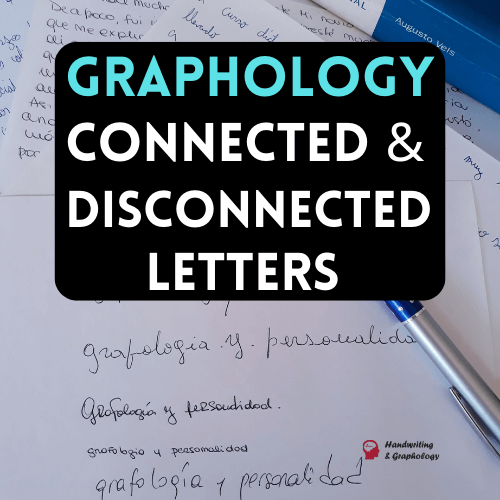
Analyzing Handwriting: Are you a Logical or an Intuitive Thinker?
Graphical continuity is the way in which letters connect with each other in each word. It is the bond or separation of the strokes in a written text. Are your letters joined or disconnected? Evidence shows that people who connect their letters apply logic over emotion.
On the contrary, those who do not connect their letters are impulsive and act on instinct. They use their intuition and imagination. is the graphical aspect in graphology, that indicates the degree of equilibrium and perseverance in ideas and conduct.
The importance of continuity in graphology, is that it expresses the degree of “connection” between desire, thinking and action, what is done by the individual. It reflects “the way of being and doing” of the human being. Graphical continuity comprises three sub-aspects that are cohesion, regularity and variability.
Cohesion: Spacing between Letters and Words
Cohesion analyzes the continuity of the bonds of the letters of each word. Analyzing Handwriting: According to how the prevailing bond in a text is, cohesion will result in:

- Very connected writing
- Connected writing
- Grouped writing
- Disconnected writing
- Combined writing
- Unequal cohesion writing
- Juxtaposed writing
- Fragmented writing
- Lapses of cohesion
- Incisions
We must not mistake cohesion with “connection”. Cohesion is linked to the aspect of continuity, while connection is related to the shape graphical aspect of the bonds between letters.
How to measure Cohesion in Graphology
Cohesion of the writing is given by the bond of the final stroke of letters with the initial stroke of the following letter. Analyzing Handwriting. Cohesion of writing is determined by the percentage of existing bonds between letters in a text. In order to classify writing into connected or disconnected we must calculate the percentage of connected letters and disconnected letters in detail, whether they are uppercase or lowercase. We also analyze cohesion within the same letter (like in the case of connected ovals or ovals separated from the downstroke or from the upper extensions and lower extensions that connect a letter to the other, or the top of letters “m” and “n” fragmented).
Letters that are executed in two strokes (like “t”, or the dot of the “i” are not easy to analyze, since when we place the dot in letter “i”, the bar of the “t”, an accent mark, it is natural to stop, place the period, the bar and return to the writing. We should always use original samples of writing and dispose of all photocopies, where it is hard to identify juxtapositions and we can incur in mistakes.
How should graphical continuity be?
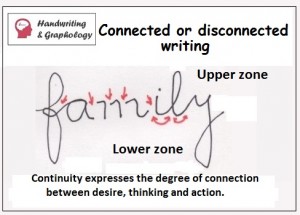
“Healthy” graphical continuity should respond to grouped cohesion, with rhythmic regularity and evolved variability in a positive sense. Progressive, with fluidity, without obstacles, spontaneous, without rigidity, with an order in relation to shape and space, evolved, that acquired maturity, getting over the phase of learning. Graphical continuity which is equilibrated and without excessive cohesion expresses harmony between logical reasoning and deductive-inductive reasoning between thinking and action.
Interpretation of Connected and Disconnected Letters
Each word is the mental representation of a concrete object that will be connected to some experience in our lives. When we mentally represent an object that does not evoke an unpleasant or traumatic experience, an impulse of action and realization is generated without impediments, without interruptions. That is why the writer of connected writing goes from an idea to action without obstacles. Extraversion prevails and he adjusts well to the environment.

In the case of disconnected or juxtaposed writing without air connection, the individual requires support to connect with the environment, is insecure, inhibited, introverted, needs to ”ruminate” the stimuli in order to reflect before acting. Instead of facing situations as a whole, he separates them, like letters from words and analyzes in a partial way, judges, which makes relationships harder. The more inequality in space, shape and movement, the greater the difficulty between continuity between what he thinks and what he does will be.
When writing is disconnected or juxtaposed but there are air connections and the rhythm is progressive, we interpret that as a positive sign.
Cohesion reflects equilibrium between feeling, thinking, and the ability to take it to action. Each “cut” expresses a detention. That is why we must evaluate the rest of the text, in order to determine whether the interruptions are accompanied by progressive movements or there is a predominance of shape in letters resulting in a slow writing.
Graphical continuity is an indicator of health, given that when the fluidity of the stroke is hindered or deteriorated, there is a possibility for early detection of signs of illnesses, either organic or psychological. Graphical continuity is related to the three spheres of personality: intellectual, socio-affective and instinctive.
When the bonds in letters are conjugated in a fluid way in the middle area (area for affection that expresses the present reality of the Ego), there is room for thoughts and impulses to be expressed without interfering in the rhythm. Interruptions may come from excessive reflection, doubts or inhibitions. If the graphism is excessively disconnected, this may express states of deep anxiety or anguish. Graphical continuity expresses the degree of integration of the individual to the environment.
Logical or Intuitive thinking in writing
The more cohesion, the faster the speed of mental processes and logical reasoning, while disconnection expresses more intuition and less ability for reflection. Connection in strokes represents initiative, decision and persistence in activities, without the need to interrupt tasks. Cohesion transmits extraversion and ability to relate socially.
Very Connected Writing
When the percentage of cohesion is too high in lowercase, uppercase ovals and upper connections and lower connections, letters are mostly connected, bonded to each other, it is called very connected writing. Ideas flow naturally, the individual is persistent, possesses great logical capacity and creates good relationships. When he begins a task, he does not like to interrupt it until he finishes the same.
When very connected writing comes together with a lot of movement, it is associated to the need for constant activity, impatience that makes the task more difficult, obstinacy, imperious desire of occupying time, inability to stay away or take distance from situations in order to reflect. They are pragmatic with limited creativity.
What is Connected Writing?
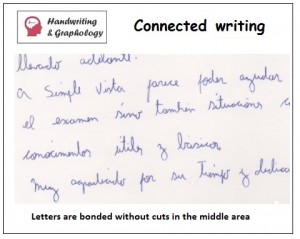
Writing is considered connected when the percentage of bonds ifs high, especially in lowercase letters. Connecting is bonding. Letters are bonded without cuts in the middle area, and are only interrupted to place a dot, accent marl or “t” bar. This writing is associated to progressive writing and reflects a personality that is able to fusion up and identify with, by affinity or empathize with the other without impediments. Participates and integrates without reservations, enjoys contact with each person or situation. Extroverted, feels no fear, there are no obstacles that stop him. He is not inhibited before contact with the outside and is able to put ideas into practice, his desires and vital needs. It is the writing of individuals with a practical sense who achieve greatly positive results, who relate ideas and arguments with logics and mental ability. Sociable, extroverted, persistent, tenacious, emotionally stable.
Grouped Writing
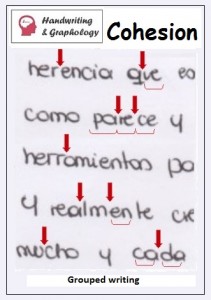
When the percentage of bonds is intermediate, (of 50% approximately) and words are formed by letters that connect in two, three or more, it is called grouped writing.
Those who write this way have a great ability for adaptation of their inner lives to circumstances that life provide, equilibrium between reflection and impulse, introversion and extroversion, isolation and sociability, submission and independence.
At work, their rhythm is fluctuating, is goes by with moments of activity and others of passivity. As we always recall, we need to keep the graphical context in mind. In a negative way, these movements may cause dissatisfaction, insecurity and instability in bonds.
Disconnected Writing
It is the one where letters in the same word are separate. There is no continuity, no bonds or connections. Those who write with disconnected or juxtaposed letters have an analytical and critic thinking. They feel forced to separate, shred matters in order to understand them, which induces them to stop thinking. Detains in details instead of the whole, divides in order to study in depth, and assure that there are no dangers that will harm him. Reflects a defensive attitude towards the environment. This attitude is the introversion that Carl Jung refers to and the Secondary of Heymans-Le Senne.
Rational and Intuitive Thinking in Handwriting
It presents difficulties in continuity of thinking and activities. Prudence and reflection result in slower thinking processes, impossibility to appreciate the whole and only stopping in details. Although he achieves the production of work satisfactorily, he needs a period of rest in order to recover when finishing a task. Although there is a tendency for introversion and isolation in these individuals, they manage to overcome situations in social relationships. They are cautious and saving. They are inconsistent individuals who suffer emotional instability. In the negative sense, there is a lack of practical and logical sense. Egocentric tendencies. They have monotonous and regular ways of writing and may express mental weakness.
Very Disconnected Writing
Separation of letters is excessive. Almost every element is disconnected. Excessive reflection that stops decision making, extreme intuition, possible blocks, impossibility to continue tasks, irregular work activities, introversion, isolation, self-control.
Combined Writing
In this type of graphism, the graphical elements are bonded through singular and original bonds (they are associated to simplifications of the shape aspect); for example, starting from a dot, or the “t” bar, a stroke that bonds one letter to the next one with a very dynamic movement is done. It results in a fast writing, which is executed with naturality and originality. It expresses mental agility, creativity, vivacity, initiative, ability for association and assimilation of ideas and deduction, memory, quickness for thinking. It provides an idea of synthesis, abbreviation, summing up, and concentration in the essential. From the negative point of view with soft or loose writing, it may reflect laziness, intellectual fatigue, hasty deductions and disorder signs.
Juxtaposed Writing
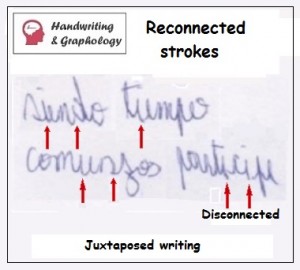
Strokes appear connected at first sight, but looked at closely with a device or magnifying glass we can see they are reconnected. We need to differentiate this from typographic or script writing.
Disconnected and juxtaposed writing: Connected writing expresses the need for contact with the environment. It expresses the idea towards the action without obstacles or impediments and expresses feelings spontaneously. In juxtaposed writing, just like in disconnected writing we identify people with the need for reflection, thinking and observing before deciding or acting. Any cut or incision is a shadow that interposes between the Ego and the Id, between desire and action, between impulse and the governing conscious. Incision is a term introduced by Trillat in order to refer to the cuts that appear in some connections of letters in words. He classifies them into: Initial incision, central incision, phonetic incision (cut in syllables) and constant incision (disassociated letters). Suppression of the graphical impulse expresses a block in thinking and in nervous activity that, according to the rest of the context, will provoke an alert on the professional.
In reconnected writing it is also fundamental to determine the graphical environment. If we are before a writing of a positive graphical environment, of a good level, strokes that flow, it denotes difficulties in social bonds that are attempted to be dissimulated and superficial relationships are established. If the graphical environment is negative, with a slow writing, of a low level, clumsy (like children´s), we infer difficulty to create ideas, insecurity, adaptation difficulties, selfishness, lack of practical sense, slowness in decision-making.
Fragmented letters in Writing
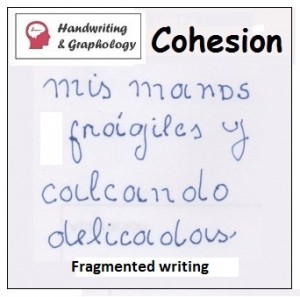
In this case, the cuts appear inside the same letter, being disarticulated (for example, the ovals that are disconnected from the downstroke in the case of letters “d” and “g” or an “m” in three parts). It is disconnected writing, taken to extreme. It is interpreted as a subconscious process that disturbs, hypersensitivity, anxiety, predominance of intuition, introversion, and withdrawal of the individual. With a shaky writing (torsions, swings, shakes, retouches, we infer the presence of organic sufferings (respiratory, circulating, neurologic) that provoke anxiety, uncertainty and anguish. Disintegration of the personality.
Types of Cohesion
- Uniform cohesion: In this case, the type of cohesion (whether they are connected, disconnected or grouped letters) is preserved without great modifications. This means that what is reflected from the psychological point of view is that the individual is constant in his life (working rhythm, bonds, vitality).
- Unequal cohesion: Not only we analyze the inequalities of cohesion in a same text, but we also take into account the differences of a writing to another. This reflexes hesitations, doubts, inner fights, indecision, ambivalence, great emotive nature, emotional instability, compulsive behavior.
The zone of writing in which the inequality is presented will influence the corresponding personality sphere. Inequality is a sign of receptivity and sensitivity due to exaggerated emotive nature. If it appears in the superior area, it will have a different interpretation than if found in the middle or inferior area.
What are Lapses of Cohesion in Graphology?

Lapses of cohesion are exaggerated blank spaces found between letters in the same word (from the point of view where the graphism interrupts a letter to the point where movement is resumed in the interior of the same word). Term coined by Augusto Vels in 1945. Any abnormal interruption of the graphical wave supposes an interrupted impulse, an inhibiting defense mechanism that acts trying to avoid anguish. This lapse on occasions is so powerful that might develop the appearance of retouches, mistakes, clumsiness in writing of letters and following words. It indicates fear, indecision, repression, very severe Superego, shyness, lack of trust, prudence, locked thinking, desire for perfection. Ion the negative side: anguish, hesitation, doubt, insecurity, inability to solve situations quickly.
Analyzing Handwriting: Regularity
Regularity is a sub-aspect of continuity, very studied by Klages. Accepted only in the scholar model and must not be admitted as acceptable in adults.
- Regular writing: It is considered regular when movements are constant, uniform, respond to an effort of disorder and organization. It is typical in organized people, with predominance of will over emotions or instincts. Puritanism. If it presents angles, it would indicate inflexibility. Difficulty in adaptation and approaching, but when achieved, they are loyal and committed individuals. On the negative side, they may be routine and rigid individuals. Rigidity of the graphism hides neurosis and psychosis.
- Irregular writing: There are inequalities and disproportions in height, width, slant and direction. Disproportions affect one or all graphical aspects. Open intelligence and receptive to new stimuli. Predominance of emotions over reason, weak will, ambivalence, inconstancy, changing individuals of instable bonds.
Analyzing Handwriting: Variability
It reflects the changes that are produced in the graphism along life.
- Constant writing: In writings of different moments of the same individual, in which we do not perceive variations from one text to another.
This is interpreted as low emotive nature and impressionability. Firmness, security, trust in oneself. Constant and stable in tendencies and decisions, friendly relationships and affective bonds. It may be hard to express feelings. With a harmonic writing, fidelity and loyalty. With round writing, slow and uniform: Passive stability, of constant costumes that makes him predictable, apathy, routine, conventionalism. It is associated to phlegmatic temper.
- Evolved writing: The development of the graphism is usually proportional to the maturity of character and personality. Evolved writing is the one that has acquired such a degree of maturity that may be described as NORMAL, has overcome the stages of learning, flows in a natural way, without obstacles, it is appreciated in the form, direction and dimension. Mental evolution, affective, spiritual, social and professional maturity.
- Regressive writing: The same way personality regresses and moves backwards instead of growing and maturing, writing also can regress due to illnesses sufferings, changes in lifestyle and profession.
- Inconstant writing: There is no similarity between writings of the same person: Instability, emotive nature, impressionability, typical in melancholic temper.
This concludes the article about Analyzing Handwriting. Feel free to share it with your contacts if you found it useful. Keep reading this blog to learn more about Learn Graphology: What does your handwriting say about you and Letter i in handwriting Analysis. Follow us on Facebook!
Read also: Definition: What is Handwriting Analysis?
Когда мы общаемся с людьми, то наша основная цель — передать информацию и быть правильно понятыми. Достичь этого будет гораздо проще с помощью специальных слов–связок – «linking words» или «linkers» – которые не просто украшают речь, но и помогают собеседнику понять сюжет вашего сообщения.
В русском языке мы также используем подобные слова: «например», «поэтому», «прежде всего», «в общем», «кроме того», «несмотря на это», «очевидно» и т.д. Давайте разберемся, какие английские эквиваленты таких слов и выражений входят в необходимый минимум для свободного общения
Пройдите тему в онлайн тренажере:
- Топ 100 слов уровня Pre-Intermediate
- Топ 100 слов уровня upper-intermediate
- Топ 100 слов уровня Intermediate
- Топ 100 фразовых глаголов
- Топ 100 слов уровня Elementary
Одной из основных целей каждого человека, изучающего иностранный язык, является сделать свою речь как можно более богатой, непринуждённой и приближённой к оригинальному варианту разговора.
Самый простой пример это слово and (и). Да, это союз, но в сложных предложениях он выступает связующим звеном между простыми предложениями.
Связующие слова нельзя отнести к определённой части речи, так как словом-связкой может быть и союз, и наречие, и предлог, и частица и так далее. Но основная функция этих помошников заключается в том, что они придают нашим высказываниям логически завершённую форму, такой себе четкий контур, к которому стремилась наша мысль.
| Категория | Слова и выражения | Пример |
| Причина и эффект | because (of) — потому что; так как; затем что; ибо; ввиду того, что; so — же; насколько; чтобы, таким способом, указанным образом, с тем чтобы; так; accordingly — соответственно; таким образом; следовательно; поэтому; в соответствии; thus — следственно, таким образом, в силу этого, так что, благодаря этому; consequently — следовательно; в результате; поэтому; вследствие этого; hence — следовательно; в результате; отсюда; therefore — по этой причине; вследствие этого; следовательно; потому; as – так как, ; оттого что; в связи с тем что; в силу того, что; due to (the fact that) – в связи с, согласно (тому что), по причине, исходя из, из-за, вследствие; owing to – по; из-за; вследствие; по причине; благодаря; since – по той причине что, учитывая, что. |
We had to wait because, it was raining. — Нам пришлось подождать, потому что шел дождь. |
| Акцентирование внимания | typically – как правило, типично, по большей части, как обычно, в большинстве случаев; as a general rule – как правило; обычно; в общем и целом; surprisingly – поразительно; на удивление; как ни странно; неожиданно; obviously – очевидно; безусловно; конечно; чересчур открыто; разумеется; in fact – собственно; фактически; более того; кстати; вообще; вообще-то; especially – в особенности; главным образом; в частности; особенно; clearly – бесспорно, прямо, разумеется, явно, четко, понятно; importantly – что немаловажно, важно; значительно; |
I don’t want to talk about this, especially with her. – Я не хочу говорить об этом, особенно с ней. |
| Сравнение | similarly — подобным образом; так же; аналогично; подобно; сходно; точно так ж; likewise — также; более того; тоже; так же, таким же образом; whereas — исходя из того, что; с учётом того, что; в связи с тем, что; on the other hand — зато; с другой стороны; но с другой стороны; впрочем; однако; except — за вычетом/исключением; кроме как; не говоря о; помимо; by comparison — для сравнения, в то время как; сравнительно; when compared to — по сравнению с; equally — в равной степени; одинаково; равно; наравне; in the same way — точно таким же образом; подобным образом; |
Life is difficult in extreme polls; similarly, it is horrible near the Equatorial regions. |
| Контраст | however — однако; yet — при этом, с другой стороны, впрочем, в то же время; still — при этом; even though — но хотя; несмотря на то,что; и хотя; даром что; on the other hand — хотя, с другой стороны, что же касается; otherwise — без этого, в противном/ином случае; after all — ведь, как-никак, не стоит забывать что, к тому же, напоследок; on the contrary — как раз наоборот, совсем наоборот, на самом деле, напротив; in contrast — в отличие от этого; для сравнения; напротив; unlike — в отличие; instead of — взамен; чем (вместо чего-л.); вместо; alternatively — или же; вперемежку; поочерёдно; иначе; наоборот; although, even – даже если; but – но, ведь; всего; исключая; хотя; |
Simon did not pass the exam then; nevertheless, he got high skills in English now. — Саймон не справился с экзаменом тогда, как бы то ни было, у него все отлично с английским сейчас. |
| Дополнение | and — и, причем, а не, при этом, а также, тогда как; also — тоже; притом; при этом, а еще, также, в том числе, кроме того; even — вровень; даже; точно; хоть; на одном уровне; ровно; again — снова, опять же, вновь; ещё раз; к тому же; кроме того; вдвое; further — к тому же, также, еще; к тому же; similarly — подобным образом; так же; аналогично; подобно; сходно; точно так же; as well as — а также; а также и; так же как; также; заодно и; apart from – кроме. исключая; наряду; не говоря о; независимо; оставляя в стороне; besides – кроме того; помимо того; также; вдобавок к тому; кроме; помимо; кстати; in addition – к тому же; moreover – кроме того; более того; сверх того; к тому; мало того; too – очень; крайне; также; тоже; к тому же. |
It is very hot today; moreover, there is a power outage. — Сегодня очень жарко, кроме того, произошел перебой питания. |
| Пример, подтверждение | for instance — например; in this case — в этом случае; in another case — в другом случае; in this situation — в данной ситуации; in this manner — таким образом, таким способом, эдак (этак); to illustrate — для иллюстрации / наглядного примера; to my mind — на мой взгляд, по моему мнению; in my opinion – по моему мнению, на мой взгляд; from my point of view – с моей точки зрения; for example – например; as follows – следующий; such as – такой как; |
I think he is very rich; for example, he gave a hundred bucks to a hobo. — Я думаю, он очень богат, например, он дал 100 баксов бомжу. |
| Последовательность | first — в первую очередь, во-первых, первоначально; second — во вторую очередь, во-вторых, в следующих, далее; third — в-третьих, в третью очередь, третье; next — далее, следующим шагом, потом; затем; после; then — затем, позже; после чего, то время; в дальнейшем; following — исходя из этого, в результате, вследствие; now — теперь, нынче, вот, итак, в настоящее время; at this point — на данный момент, на этой стадии; на этом месте, пока что; after — после; eventually — в конечном счёте; в итоге; со временем; однажды; finally — наконец, в конце; в заключение; под конец; в конце концов; в конечном счёте; lastly — на последнем месте, в конце; в заключение; под конец, наконец; previously — предварительно; заранее; ранее; прежде; раньше; уже; |
First, I’d like to get to know you. — Сперва, я бы хотел познакомиться с тобой. |
| Подведение итогов | on the whole — в целом; учитывая все обстоятельства; в итоге; вообще; в среднем; in sum, to sum up, in summary – подводя итог; thus — таким образом, отсюда и; as a consequence – как результат, в результате, соответственно, и, как следствие; as a result – в результате; hence – таким образом, исходя из этого, получается, следственно; in brief, in short – коротко, вкратце; in conclusion – в заключение, в завершении, напоследок, подводя итоги; so – итак, therefore – таким образом, по этой причине; вследствие этого; следовательно; потому; to conclude – делая выводы; |
In brief, it is a good film. — Короче, это хороший фильм. |
Читай также
Геймификация как средство повышения мотивации
Время и последовательность
Если мы рассказываем о каком-то процессе, например, приготовлении салата или строительстве дома, и хотим логически выделить его этапы, то нам пригодятся такие слова-связки:
- firstly, to begin with, for a start, first of all — начало процесса;
- after that, next, secondly, subsequently — продолжение;
- to conclude, finally, last of all — завершение.
Советуем к прочтению: Чем отличается Start от Begin?
First of all, choose the place where you would like to spend your holidays. After that, you should book tickets and a hotel room. Finally, you can start packing suitcases.
Дополнение
Когда мы дополняем сказанное новыми фактами, можно использовать следующие фразы:
in addition to, apart from, besides, moreover, as well as, also.
Apart from the budget, we discussed new marketing strategies.
Высказывание своей точки зрения
Иногда нужно подчеркнуть, что какая-то идея — это именно ваше мнение. С одной стороны, вы можете выделить оригинальность вашей мысли, с другой стороны, такое высказывание звучит менее категорично и более вежливо. Вот некоторые связующие слова для выражения ваших собственных суждений:
- to my mind, it seems to me;
- inclined to think, strongly believe.
I am inclined to think that our government should take more effective steps to protect the environment.
Ссылка на других
Это очень даже по-английски — преподносить какой–либо факт, ссылаясь на общественное мнение. Как и в случае с собственной точкой зрения, это помогает избежать категоричности и делает любое заявление более лояльным:
- it is said that, it is usually believed, it is claimed that;
- people often think, some people argue that.
It is usually believed that black cats bring bad luck.
Пример и подтверждение
Чтобы убедиться, что вас поняли правильно, можно повторить основные моменты другими словами или с использованием конкретных примеров:
- in other words, for example, to illustrate;
- namely, one example of this.
Nowadays, healthy lifestyle is becoming really popular. For exampe, the fact that more and more people stop smoking.
Сравнения и контраст
Иногда нам нужно показать контраст между несколькими явлениями или фактами, иногда мы хотим найти сходство между ними. В обоих случаях можно использовать соответствующие слова–связки:
- in contrast, in spite of, however, in comparison with, unlike — эти слова показывают различия;
- similarly, just like, likewise, in the same way, equally — способы передачи сходства.
I have always liked reading books, unlike my brother, who really hates it. However, we enjoy watching movies together.
Причина и эффект
Если мы хотим донести до собеседника логическую структуру каких-то событий, показать, что именно привело к таким последствиям, то нам помогут такие фразы:
- because of, due to, since, as;
- therefore, consequently, as a result, so.
Yesterday he was stuck in a traffic jam. Because of that he was late for the meeting.
Акцентирование внимания
Чтобы подчеркнуть значимость своих слов, обратить на них внимание собеседника, возьмите себе на вооружение некоторые из этих слов:
- indeed, in fact, particularly, no doubt, obviously,
- needless to say, as a matter of fact, surely, certainly.
Needless to say, I was really glad to receive such a nice present.
Предложение альтернативы
Если у нас есть возможность рассмотреть другие варианты развития событий, почему бы не показать это? Всегда приятно иметь выбор, поэтому берите любое словосочетание из этой подборки:
- on the other hand, alternatively;
- the alternative is, another possibility would be.
Not everyone can find enough free time for attending English courses. The alternative is to study English via Skype.
Подведение итогов
Когда вы делаете выводы, нелишним будет повторить основные пункты с помощью определенных связующих слов:
- as has been noted, finally, in brief, in short,
- to summarise, in conclusion.
In conclusion, I’d like to say that this contract is extremely important for our company.
Читай также
Сколько всего слов в английском языке?
Заключение
Мы надеемся, что отныне ваша речь станет более красивой, благодаря данной статье. To summarize, хотелось бы добавить 3 общих совета по использованию слов-связок. Помните, что:
- все хорошо в меру, поэтому не стоит переусердствовать с количеством;
- лучше освоить 10 простых linking words, чем быть непонятым из-за употребления сложных;
- даже если какое-то выражение вам очень нравится, не стоит начинать с него каждое предложение.
Студенты, которые занимаются на наших занятиях по Скайпу, так любят фразу «I think», котора легко заменяется на «I believe» или «I suppose». Keep that in mind and be creative!
Спасибо за внимание и до скорой встречи!
Большая и дружная семья EnglishDom
Unless you are a robot, then you know that writing requires some level of flow for readers to understand. Connecting words or linking words help writers create continuity in writing.
In this guide, we will cover not only what connecting words are, but their functions and when to use them.
A Quick Review of Conjunctions
Connecting words, at their core, are just conjunctions. But, when you are unsure of what a conjunction is, then you can’t effectively use connecting words.
A conjunction is a word that links other words, phrases, or clauses together.
There are three kinds of conjunctions: coordinating, correlative, and subordinating. Each of these conjunctions includes connecting words, so it’s safe to safe that connecting words and conjunctions are virtually the same thing.
The most significant difference with connecting words is that they also include phrases to more clearly express a thought.
The Original Coordinating Conjunctions
We are taught coordinating conjunctions in elementary school, so it’s easy to understand why this might feel easy to some. Do you remember how you were taught in school to remember connecting words? If you’re like me, then teachers drilled us to recognize the simple mnemonic device: F A N B O Y S
Fanboys is a group of letters that each represents a connecting word.
F = For
A = And
N = Not
B = But
O = Or
Y = Yet
S = So
These basic connecting words are the jumping – off point to dig deeper into the various purposes of connecting words.
Below we have extended the list of connecting words to the eight most common roles of connecting words.
One Final Usage Rule
It is commonly taught that coordinating conjunctions should never be at the beginning of a sentence. But this is incorrect. There are many opportunities where it is correct to use a conjunction at the beginning of a sentence.
Do English usage rules like this confuse you? You’re not alone. English is complicated and filled with rules that can make it difficult to know if you are trying to become a better writer.
ArgoPrep is ready to help! With online access to countless resources, users have seen an improvement to their test scores and abilities in as little as 30 days.
What are Connecting Words?
A connecting word or phrase is used to connect two separate thoughts. You could use connecting words for a variety of different reasons, including:
- To Give Examples
- Add Information
- Summarize
- Sequence Ideas
- Give a Reason
- Give a Result
- Contrast Ideas
- Emphasize a Thought
- To Make a Concession
- To Generalize a Thought
- To Restate Prior Thoughts
Connecting words go by a variety of different names, including linking words and transitions. At the core, all of these things have the same goal, which is to connect thoughts in writing.
Just like the example above of the robot, without connecting words, writing can feel blocky and unrelated.
Connecting words serve as the glue to bind thoughts together in a logical way and also helps drive home the “point” (or ) of writing.
Examples of Connecting Words
| Type | example |
| To Give Examples |
|
| Add Information |
|
| Summarize |
|
| Sequence Ideas |
|
| Give a Reason |
|
| Give a Result |
|
| Contrast Ideas |
|
| Establish Opposition |
|
Conclusion
If you want to add interest to your writing, but aren’t sure how a great place to start is connecting words. There are many different forms of connecting words, so it’s important to determine your purpose before selecting the words you’re going to use.
Let’s review:
- Conjunctions are the basic form of connecting words.
- There are three kinds of conjunctions: coordinating, correlative, and subordinating.
- The most basic conjunctions are the words that create fanboys (for, and, nor, but, or, yet, so).
- Connecting words connect different thoughts.
- There are many kinds of connecting words to use so that your purpose can be communicated to your readers.
- If you are struggling with concepts like connecting words, check out ArgoPrep for easy-to-use and high-impact resources to help you grow.
Содержание:
- Что такое слова-связки
- Виды слов-связок для письма и говорения
- Советы по использованию linking words
Основная цель нашей речи – и устной, и письменной – состоит в том, чтобы четко и ясно изложить информацию, донести мысль до слушателя или читателя, убедить его в своей правоте. Для достижения этой цели нужно последовательно излагать идеи, логически выстраивать свое повествование и выделять главные мысли. Слова-связки в английском языке предназначены именно для этого: они помогают показать связи между идеями, упорядочить высказывание, сделать его цельным и понятным аудитории.
Что такое слова-связки
Слова-связки (linking words) – это слова, которые используются для объединения частей высказывания, связи идей и создания логичного перехода от одной мысли к другой. Связующие слова и фразы могут соединять части сложного предложения или части текста. Они помогают автору речи делать акценты, выводить одну мысль из другой и шаг за шагом излагать свои мысли, как бы проводя аудиторию за руку от одной идеи к другой. Связки важны как для говорения, так и для письма.
Связки могут принадлежать разным частям речи. Самые простые примеры связок – and (и), but (но), so (таким образом), because (потому что). Они часто используются в повседневной речи и знакомы даже начинающим. В статье мы приведем примеры более сложных слов и фраз, которые могут пригодиться в деловых переговорах, публичных выступлениях, а также в написании текстов для ОГЭ и эссе для ЕГЭ.
Виды слов-связок для письма и говорения
Рассмотрим разные виды связующих слов в зависимости от их значения и роли в тексте.
- Sequence (последовательность)
Следующие слова помогут вам организовать логическую последовательность в тексте, упорядочить мысли. Их можно разделить на три группы: начало речи, продолжение, подведение итогов.
|
Beginning (начало) |
||
|
first/firstly |
[fɜːst] / [ˈfɜːstli] |
во-первых |
|
first of all |
[fɜːst ɒv ɔːl] |
прежде всего |
|
the first point is… |
[ðə fɜːst pɔɪnt ɪz] |
первый пункт |
|
to begin/start with |
[tuː bɪˈgɪn wɪð] / [tuː stɑːt wɪð] |
для начала |
|
first and most importantly |
[fɜːst ænd məʊst ɪmˈpɔːtəntli] |
первое и самое главное |
|
first and foremost |
[fɜːst ænd ˈfɔːməʊst] |
в первую очередь |
|
let us begin/start with… |
[lɛt ʌs bɪˈgɪn wɪð] / [lɛt ʌs stɑːt wɪð] |
начнем с… |
|
initially |
[ɪˈnɪʃəli] |
первоначально |
|
at the beginning |
[æt ðə bɪˈgɪnɪŋ] |
вначале |
|
Going further (продолжение) |
||
|
second/secondly |
[ˈsɛkənd] / [ˈsɛkəndli] |
во-вторых |
|
third/thirdly, etc |
[θɜːd] / [ˈθɜːdli] |
в-третьих, и т. д. |
|
the second/third point is… |
[ðə ˈsɛkənd pɔɪnt ɪz] / [ðə θɜːd pɔɪnt ɪz] |
второй/третий пункт |
|
next |
[nɛkst] |
следующий |
|
and then |
[ænd ðɛn] |
затем |
|
also |
[ˈɔːlsəʊ] |
также |
|
another |
[əˈnʌðə] |
следующий |
|
in addition |
[ɪn əˈdɪʃ(ə)n] |
в дополнение |
|
moreover |
[mɔːˈrəʊvə] |
более того |
|
further/furthermore |
[ˈfɜːðə] / [ˈfɜːðəˈmɔː] |
далее |
|
subsequently |
[ˈsʌbsɪkwəntli] |
впоследствии |
|
simultaneously |
[ˌsɪməlˈteɪniəsli] |
одновременно |
|
formerly |
[ˈfɔːməli] |
прежде |
|
previously |
[ˈpriːviəsli] |
ранее |
|
Concluding (заключение, подведение итогов) |
||
|
last/lastly |
[lɑːst] / [ˈlɑːstli] |
последний |
|
last but not the least |
[lɑːst bʌt nɒt ðə liːst] |
последнее, но не по значению |
|
finally |
[ˈfaɪnəli] |
наконец |
|
in conclusion |
[ɪn kənˈkluːʒən] |
в заключение |
|
to summarise |
[tuː ˈsʌməraɪz] |
подводя итог |
|
to sum up/summing up |
[tuː sʌm ʌp] / [ˈsʌmɪŋ ʌp] |
резюмируя/подводя итоги |
|
ultimately |
[ˈʌltɪmɪtli] |
в конце концов |
Приведем примеры предложений для эссе или устной речи, где вы можете использовать эти связующие слова:
|
To begin with, there are many causes of cultural differences. |
Начнем с того, что существует множество причин культурных различий. |
|
Firstly, there is the history of the people. |
Во-первых, это история народа. |
|
Secondly, geographical location and climate conditions. |
Во-вторых, географическое положение и климатические условия. |
|
Furthermore, religion plays an important part in national culture. |
Кроме того, религия играет важную роль в национальной культуре. |
|
In addition, there is also the economy and politics of the country. |
К тому же есть еще экономика и политика страны. |
- Result (результат)
Следующие слова и фразы указывают на следствие или результат того, что было сказано в предыдущих предложениях. С их помощью вы можете выразить причинно-следственные связи.
|
so |
[səʊ] |
таким образом |
|
as a result |
[æz ə rɪˈzʌlt] |
так |
|
as a consequence (of) |
[æz ə ˈkɒnsɪkwəns ɒv] |
вследствие этого |
|
consequently |
[ˈkɒnsɪkwəntli] |
вследствие |
|
due to |
[djuː tuː] |
ввиду |
|
because/because of |
[bɪˈkɒz] / [bɪˈkɒz ɒv] |
по причине |
|
since |
[sɪns] |
поскольку |
|
therefore |
[ˈðeəfɔː] |
следовательно/по причине |
|
thus |
[ðʌs] |
таким образом |
|
hence |
[hɛns] |
следовательно |
|
accordingly |
[əˈkɔːdɪŋli] |
соответственно |
|
for this reason |
[fɔː ðɪs ˈriːzn] |
по этой причине |
|
for that reason |
[fɔː ðæt ˈriːzn] |
по этой причине |
|
on account of this |
[ɒn əˈkaʊnt ɒv ðɪs] |
в связи с этим |
- Emphasis (акцентирование внимания)
Слова и фразы этого типа используются, чтобы выделить особо важную мысль, подчеркнуть ключевые моменты речи, усилить определенную идею.
|
undoubtedly/no doubt |
[ʌnˈdaʊtɪdli] / [nəʊ daʊt] |
без сомнения |
|
indeed |
[ɪnˈdiːd] |
действительно |
|
obviously |
[ˈɒbvɪəsli] |
очевидно |
|
admittedly |
[ədˈmɪtɪdli] |
по общему признанию |
|
particularly/in particular |
[pəˈtɪkjʊləli] / [ɪn pəˈtɪkjʊlə] |
в частности |
|
generally |
[ˈʤɛnərəli] |
обычно |
|
especially |
[ɪsˈpɛʃəli] |
особенно |
|
specifically |
[spəˈsɪfɪk(ə)li] |
конкретно |
|
in fact |
[ɪn fækt] |
на самом деле |
|
clearly |
[ˈklɪəli] |
безусловно |
|
especially |
[ɪsˈpɛʃəli] |
особенно |
|
mainly |
[ˈmeɪnli] |
главным образом |
|
notably |
[ˈnəʊtəbli] |
в особенности, заметно |
|
needless to say |
[ˈniːdlɪs tuː seɪ] |
само собой разумеется |
|
indeed |
[ɪnˈdiːd] |
действительно |
|
truly |
[ˈtruːli] |
истинно |
|
certainly |
[ˈsɜːtnli] |
определенно |
|
surely |
[ˈʃʊəli] |
несомненно |
Перечисленные выше выражения могут встретиться как в личном письме, так и в официальной речи, например:
|
It is mainly used in questions and negative statements. |
Он в основном используется в вопросительных и отрицательных предложениях. |
|
Needless to say that literature is a very important part of human culture. |
Излишне говорить, что литература – очень важная часть человеческой культуры. |
|
Undoubtedly they are both excellent engineers. |
Несомненно, они оба отличные инженеры. |
|
Obviously you didn’t read it. |
Очевидно, вы не читали это. |
|
Surely, this question is very important. |
Без сомнения, этот вопрос очень важен. |
- Example (пример)
Приведенные ниже слова для связки предложений используются, чтобы уточнить свои идеи и проиллюстрировать их примерами.
|
for example |
[fɔːr ɪgˈzɑːmpl] |
например |
|
for instance |
[fɔːr ˈɪnstəns] |
к примеру |
|
that is |
[ðæt ɪz ] |
то есть |
|
such as |
[sʌʧ æz] |
такие как |
|
namely |
[ˈneɪmli] |
именно |
|
proof of this |
[pruːf ɒv ðɪs] |
доказательство этому |
|
like |
[laɪk] |
подобно, такие как |
|
including |
[ɪnˈkluːdɪŋ] |
включая |
|
to demonstrate |
[tuː ˈdɛmənstreɪt] |
чтобы продемонстрировать |
|
to clarify |
[tuː ˈklærɪfaɪ] |
чтобы внести ясность |
|
in this case |
[ɪn ðɪs keɪs] |
в данном случае |
В учебниках и научной литературе часто используются латинские фразы или аббревиатуры:
|
e.g. (exempli gratia) |
[ig’zempli ‘grætiə] / [‘i’ʤi] |
например |
|
i.e. (id est) |
[‘id æst] |
то есть |
- Addition (дополнение)
При изложении основных тезисов иногда требуется ввести в речь дополнительную информацию или побочные идеи. Ниже представлен список слов и выражений, которые помогут вам в этом.
|
and |
[ænd] |
и |
|
also |
[ˈɔːlsəʊ] |
также |
|
too |
[tuː] |
тоже |
|
as well as |
[æz wɛl æz] |
и, а также |
|
along with |
[əˈlɒŋ wɪð] |
наряду с |
|
besides |
[bɪˈsaɪdz] |
кроме того |
|
in addition |
[ɪn əˈdɪʃ(ə)n] |
в дополнение |
|
additionally |
[əˈdɪʃənli] |
дополнительно, вдобавок |
|
equally important |
[ˈiːkwəli ɪmˈpɔːtənt] |
не менее важно |
|
not to mention |
[nɒt tuː ˈmɛnʃən] |
не говоря уже о |
|
Not only… but also… |
[nɒt ˈəʊnli]… [bʌt ˈɔːlsəʊ]… |
Не только… но и… |
|
What is more… |
[wɒt ɪz mɔː]… |
Более того… |
|
One could also say… |
[wʌn kʊd ˈɔːlsəʊ seɪ]… |
Можно также сказать… |
- Contrast (противопоставление)
Иногда вам нужно сравнить идеи или явления и подчеркнуть их разницу. Таблица ниже содержит примеры слов-связок, которые выражают противопоставление.
|
however |
[haʊˈɛvə] |
однако |
|
nevertheless |
[ˌnɛvəðəˈlɛs] |
тем не менее |
|
nonetheless |
[ˌnʌnðəˈlɛs] |
несмотря на |
|
still |
[stɪl] |
все же |
|
but |
[bʌt] |
но |
|
yet |
[jɛt] |
хотя/но |
|
though |
[ðəʊ] |
хотя, впрочем |
|
while |
[waɪl] |
пока/несмотря на то |
|
whereas |
[weərˈæz] |
между тем как |
|
in contrast (to) |
[ɪn ˈkɒntrɑːst tuː] |
в противоположность |
|
on the contrary |
[ɒn ðə ˈkɒntrəri] |
напротив |
|
on the other hand |
[ɒn ði ˈʌðə hænd] |
с другой стороны |
|
unlike |
[ʌnˈlaɪk] |
в отличие от |
|
despite |
[dɪsˈpaɪt] |
несмотря на |
|
in spite of |
[ɪn spaɪt ɒv] |
вопреки |
|
alternatively |
[ɔːlˈtɜːnətɪvli] |
в качестве альтернативы |
|
conversely |
[ˈkɒnvɜːsli] |
наоборот/напротив |
|
even though |
[ˈiːvən ðəʊ] |
хотя/даже если |
|
although |
[ɔːlˈðəʊ] |
однако/несмотря на |
|
still |
[stɪl] |
все же/однако |
- Comparison (сопоставление)
Следующие слова можно использовать для выражения сходства идей или явлений, о которых вы говорите.
|
similarly |
[ˈsɪmɪləli] |
аналогично |
|
likewise |
[ˈlaɪkwaɪz] |
также |
|
like |
[laɪk] |
как |
|
also |
[ˈɔːlsəʊ] |
тоже |
|
same as |
[seɪm æz] |
такой же как |
|
similar to |
[ˈsɪmɪlə tuː] |
подобный |
|
analogously |
[əˈnæləgəsli] |
аналогично |
|
equally |
[ˈiːkwəli] |
в равной степени |
|
just as/just like |
[ʤʌst æz] / [ʤʌst laɪk] |
такой же/одинаковый |
|
in the same way/in the same manner |
[ɪn ðə seɪm weɪ] / [ɪn ðə seɪm ˈmænə] |
таким же образом/способом |
|
by the same token |
[baɪ ðə seɪm ˈtəʊkən] |
по той же причине |
|
Both… and… |
[bəʊθ]… [ænd]… |
Как… так и… |
- Generalization (обобщение)
В письменных работах для ОГЭ часто требуется ввести общеизвестную мысль или обобщить идеи. Для этого используются следующие слова:
|
generally |
[ˈʤɛnərəli] |
главным образом |
|
in general |
[ɪn ˈʤɛnərəl] |
в основном |
|
as a rule |
[æz ə ruːl] |
как правило |
|
in most cases |
[ɪn məʊst ˈkeɪsɪz] |
в большинстве случаев |
|
on the whole |
[ɒn ðə həʊl] |
в целом |
Советы по использованию linking words
Уместное употребление слов-связок поможет выстроить структуру текста и логически связать ваши мысли. Это особенно важно для сочинения на экзамене и выступления перед аудиторией. Запомните следующие правила:
- Не злоупотребляйте связками. Используйте их разумно там, где они необходимы.
- Используйте только те фразы, значение которых вам точно известно. В противном случае вы рискуете исказить свою же мысль или быть неправильно понятым аудиторией.
- Будьте разнообразны, не используйте одни и те же фразы. Постарайтесь запомнить несколько вариантов связок для разных случаев.
- Помните о пунктуации. Если связка стоит в начале предложения, после нее обычно ставится запятая. Если она используется для соединения двух предложений, обычно в конце первого предложения ставится точка с запятой, а после связки – запятая.
Репетиторы по английскому языку на Study.ru.
В базе 102 репетиторов со средней ценой 1133
Оцените статью в один клик
Сегодня мы поговорим о словах-связках (linking words) и фразах-связках в английском языке.
Содержание статьи:
Что такое linking words and phrases?
Таблицы linking words с переводом.
Упражнения на отработку linking words and phrases.
Что такое linking words and phrases?
В английской речи или на письме Вы можете использовать слова-связки (linking words) или короткие фразы (linking phrases), которые помогут организовать Вашу речь и сделать ее более логичной и понятной для того, кто Вас слушает или читает.
Слова-связки могут быть разными частями речи. Linking words важны для написания достойного и связного эссе (essay writing).
Обратите внимание, на использование слов-связок: неправильное использование linking words в английском языке может полностью изменить смысл того, что вы пытаетесь сказать.
Ниже приводятся таблицы слов-связок и фраз-связок с переводом. Этот перечень не является исчерпывающим. Будьте осторожны: хотя linking words and phrases сгруппированы в наших таблицах по сферам применения, слова-связки в каждой из таблиц не являются синонимичными – для их правильного применения необходимо уточнить перевод, а также место в предложении.
Некоторые слова-связки и фразы используются в нескольких таблицах, так как могут иметь различное (логическое) значение.
|
Listing (слова-связки, используемые для перечисления, организации логической последовательности). |
|
|
first, second, third |
Первое, второе, третье |
|
firstly, secondly, thirdly |
Во-первых, во-вторых, в-третьих |
|
first, furthermore, finally |
Во-первых, кроме того, наконец-то |
|
to begin, to conclude, in conclusion |
Для начала, чтобы сделать вывод, в завершение |
|
next, last, finally |
следующий, последний, наконец |
|
In addition, moreover |
Кроме того, кроме того |
|
Further, furthermore |
Далее / кроме того, |
Примеры с переводом
Firstly, it could be rather risky, secondly, we don’t have enough qualification. – Во-первых, это может быть очень рискованно, во-вторых, у нас нет достаточной квалификации.
And, moreover, Greg was a man of stainless character. – И, более того, Грег был человеком с честным характером.
|
Reinforcement (слова-связки, употребляющиеся для усиления, подкрепления мысли ) |
|
|
also |
также |
|
furthermore |
кроме того |
|
moreover |
более того |
|
what is more |
более того |
|
in addition |
кроме того |
|
besides |
кроме того |
|
above all |
прежде всего |
|
as well (as) |
также (как) |
|
in the same way |
таким же образом |
|
not only … but also |
не только … но и |
Примеры с переводом:
And, besides, I did not know the whole truth myself then. – И, кроме того, я и сам-то всей правды тогда не знал.
Molly is not only intelligent but also beautiful. – Молли не только умна, но и красива.
|
Similarity (слова-связки для выражения схожести / похожести) |
|
|
equally |
одинаково |
|
likewise |
также |
|
similarly |
аналогично |
|
correspondingly |
соответственно |
|
in the same way |
таким же образом |
Примеры с переводом
Development banks, likewise, increased their loan commitments in 1999. — Банки развития также увеличили объем своих кредитов в 1999 году.
|
Giving examples (слова-связки для примера, введения дополнительной информации) |
|
|
for example |
например |
|
for instance |
например |
|
as follows: |
следующим образом: |
|
that is |
то есть |
|
namely |
а именно |
|
in other words |
другими словами |
Примеры с переводом:
Three students were mentioned, namely John, Sarah and Sylvia. – Трое студентов были упомянуты, а именно Джон, Сара и Сильвия.
China, for example, faces increasing export difficulties – Китай, к примеру, все больше сталкивается с проблемами в области экспорта.
|
Summary (слова связки для подведения итогов высказывания) |
|
|
in conclusion |
в заключение |
|
to conclude |
в заключение |
|
in brief |
в кратце |
|
to summarise |
подводя итог |
|
overall |
в целом |
|
therefore |
поэтому |
Примеры с переводом:
I wish in conclusion to express the view of the Group. — В заключение я хотел бы выразить мнение Группы.
But overall, the situation has not changed much. — Однако в целом ситуация существенно не изменилась.
|
Expressing an alternative (слова-связки, которые используются для выражения альтернативы) |
|
|
alternatively |
в качестве альтернативы / как вариант |
|
rather |
скорее |
|
on the other hand |
с другой стороны |
|
the alternative is |
Альтернатива такова |
|
another possibility would be |
другой возможностью могло бы быть |
Примеры с переводом:
Alternatively, we can assume that price changes stay large even as the period gets shorter. –В качестве альтенативы, можно предположить, что изменения цен остаются значительными, даже в случае сокращения периода.
|
Result/consequence (слова-связки для выражения результата / следствия) |
|
|
so |
так |
|
therefore |
поэтому |
|
as a result/consequence |
в результате/вследствие |
|
accordingly |
соответственно |
|
consequently |
следовательно |
|
because of this/that |
из-за этого/ того |
|
thus |
таким образом |
|
hence |
Отсюда |
|
for this/that reason |
По этой / той причине |
|
so that |
так что |
|
in that case |
в том случае |
|
under these circumstances |
при таких обстоятельствах |
Примеры с переводом:
Central Asia thus remains only weakly integrated into the world economy. – Центральная Азия, таким образом, остается лишь ограниченно интегрированной в мировую экономику.
In these circumstances, there will be temporary financial loss to fishermen. – В таких обстоятельствах рыбаки будут терпеть временные финансовые потери.
|
Stating the obvious (слова-связки для выражения очевидности мысли) |
|
|
obviously |
очевидно |
|
clearly |
ясно |
|
naturally |
естественно |
|
of course |
конечно |
|
as can be expected |
как можно ожидать |
|
surely |
конечно |
|
after all |
Ведь, в общем, помимо прочего |
|
Undoubtedly |
Несомненно |
|
Indeed |
Действительно |
Примеры с переводом:
«I’ve obviously missed something,»– Видимо, я что-то недопонял.
He was, after all, a humorless child. — Он, в общем, и в детстве обладал не слишком развитым чувством юмора.
|
Emphasis (слова-связки для акцентирования мысли) |
|
|
Generally |
Вообще |
|
Admittedly |
Правда |
|
In fact |
На самом деле |
|
Particularly / in particular |
Особенно / в особенности |
|
Especially |
Особенно |
|
Importantly |
Главное |
Примеры с переводом:
Admittedly, the dates haven’t been fixed yet. – Правда, сроки еще не указаны.
More importantly, nine new services will be offered to our customers. – И, что еще важнее, клиентам будут предложены девять новых видов услуг.
Linking words exercises. Упражнения на слова-связки.
Exercise 1. Choose the correct answers to the given text.
There are many reasons for visiting the city of Rome. _________ (1) , it is a city with an interesting history.__________ (2), it was the capital of the Roman Empire. _________ (3), Rome is very beautiful, _________ (4) its many palaces, churches and squares. __________ (5), many of the city’s classical monuments have been preserved, __________ (6) it is possible to see how the city used to be. ___________ (7), many people travel to Rome every year. ____________ (8), I believe that, ___________ (9) a trip to Rome may be expensive, it is well worth visiting such a wonderful city.
|
A |
B |
C |
|
|
1 |
Since |
On the whole |
Firstly |
|
2 |
Secondly |
Finally |
Therefore |
|
3 |
in order to |
Moreover |
All in all |
|
4 |
due to |
because |
so |
|
5 |
Apart from |
However |
In addition |
|
6 |
because |
so |
And |
|
7 |
Because |
But |
For this reason |
|
8 |
To sum up |
Although |
For example |
|
9 |
moreover |
although |
due to |
Exercise 2. Choose the correct linking word.
- I have never been here before… (as/but/and) my friend has.
- We took a taxi… (in short/but/because) we were late.
- This house is beautiful… (In addition to/ However/ Because), it is in poor condition.
- I was tired, … (so/for example/since) I went to bed early.
- … (All in all / Despite / Although) she felt ill, she didn’t call the doctor.
- Some foods, … (moreover/as a result/such as) chocolate, are very fattening.
- Everyone attended the meeting… (whose / whereas / apart from) Steve, who was on holiday.
- Is this the boy… (whose/which/ what) parents own the factory.
Ответы к упражнениям на linking words.
Ex. 1.
1c, 2a, 3b, 4a, 5c, 6b, 7c, 8a, 9b
Ex. 2.
1 but, 2 because, 3 however, 4 so, 5 although, 6 such as, 7 apart from, 8 whose
Понравилось? Сохраните на будущее и поделитесь с друзьями!
Стратегия написания делового письма
Учитель английского языка
МБОУСОШ №2
им. И.И.Тарасенко ст.Выселки
Бурмитсрова Г.В.
Деловое письмо.
Деловые письма пишутся по установленной форме, часто на бланках.
Деловое письмо делят на следующие части:
в правом верхнем углу обычно ставится штамп компании с ее адресом (1-я строка – название фирмы, 2-я строка – адрес фирмы: номер дома, название улицы, город, почтовый индекс, страна) или ваш адрес, если вы пишете на имя компании;
под штампом дата письма;
в левой части наименование и адрес получателя письма;
тема письма ( для того, чтобы сразу стало понятно, о чем данное письмо и кому и в какой отдел его нужно переслать);
вступительное обращение;
основной текст письма;
заключительная формула вежливости;
подпись;
указание на приложение.
Вступительное обращение пишется следующим образом:
если вы не знаете фамилию человека или людей, к которым вы обращаетесь, письмо обычно начинается со слов Dear Sir, Dear Sirs или Gentlemen.
Если вы пишите женщине и не знаете ее фамилию, обычным является обращение Dear Madam.
Если вы знаете фамилию адресата, обычным обращением к мужчине является
Dear Mr. Smith, к женщине Dear Miss Smith (незамужней женщине), Dear Mrs. Smith (замужней женщине), Dear Ms. Smith (если вы не знаете, замужем она или нет. Эта форма приобретает все более широкое распространение).
В деловом письме в обращении НЕЛЬЗЯ писать ИМЯ после слов Mr., Mrs, Ms.
Заключительная часть письма – подпись – зависит от обращения. Если вы начали письмо с обращения Dear Sir, Dear Sirs Dear Madam или Gentlemen, в конце письма перед подписью вы должны поставить слова Yours faithfully.
Если вы начали письмо с обращения Dear Mr. Smith, Dear Miss Smith, Dear Mrs. Smith, Dear Ms. Smith обычным окончанием будут слова Yours sincerely.
Язык написания делового письма отличается от стиля личного письма. В деловых письмах язык более официален и строг; не принято употребление сокращенных глагольных форм, в то время как конструкции со страдательным залогом используются гораздо чаще для
деловой переписки характерно употребление стандартных выражений, используемых для подтверждения получения деловых писем, для выражения просьбы, при сообщении о посылке каталогов или документов, при ссылке на документы и т.д. эти стандартные выражения необходимо выучить.
Основной текст письма
Письмо-запрос, жалоба и т.п.
В начале делового письма указывается причина написания данного письма. Обычным началом могут служить выражения I am writing in connection with…
I am writing to enquire about… Если вы пишете очередное письмо по одному и тому же вопросу, то началом могут являться выражения Further to…
With reference to…
Письмо-ответ
Обычным началом является
Thank you for your letter of 12 January ( Обратите внимание на предлог of), In reply/ answer/ response to your letter of 12 January…
В сообщениях об исполнении просьбы употребляются следующие выражения:
In accordance with your request…, According to your request…, As requested (by you/ in your letter).
При извещении о посылке документов, каталогов и т.п. обычно используются следующие выражения: We are pleased/ glad to send you…, We enclose…, We send enclosed…
Деловое письмо обычно делится на абзацы. Деление подчеркивается словами:
First of all, Firstly, Secondly, Finally
Не забывайте о словах, связывающих отдельные части предложений, и вводных словах:
Moreover, In addition to it
So, As a result, Therefore
However, On the one hand… On the other hand, In contrast
In conclusion, To sum up, On the whole
Не забывайте о вежливых словах и выражениях:
I would be very pleased…
Will you be so kind to inform me…
I will be obliged if you could …
I would appreciate if you could…
Заключительная формула вежливости включает в себя такие выражения, как:
I look forward to hearing from you soon. If you require any further information please do not hesitate to contact us.
9 Svetlaya St.
Krasnogorsk 114965
Russian Federation
Anne Smith
225 Phillips Boulevard
Manchester 0834184
United Kingdom
4 December, 2010
Dear Miss Smith,
Further to our telephone conversation, I would like to confirm the following arrangements for your arrival.
Your group arrives on 3 January at 2.15 p.m. You will be met at the railway station by our representative. He will take you to the hotel in Moscow (the address and hotel conveniences are enclosed).
If you require any further information, please do not hesitate to contact us.
Yours sincerely, Kate Smirnova
Подготовка к ЕГЭ.
Упражнения для подготовки к написанию делового письма.
Задaние 1
Write the dates according to the rules given above.
1st March, 1947; 15/12/1944; 3/10/1971 (USA); 27/10/1980; 6/2/1978 (UK);
5/7/2002 (USA); 2nd April, 1994; 9/3/1942 (USA)
Задaние 2
Match the opening of the letter on the left with its closing on the right.
|
Dear Gentlemen |
Best wishes |
|
Dear Miss Smith |
Yours sincerely |
|
Dear Ms. Black |
Yours faithfully |
|
Dear Sirs |
|
|
Dear Madam |
|
|
Dear Mr. Green Dear Ann |
|
|
Dear Mrs. Wilson |
|
|
Dear Jack |
Задaние 3
Match the Russian word-combinations on the left with their English equivalents on the right.
|
1. в дополнении к |
a. Yours faithfully |
|
2. в целом |
b. in response to |
|
3. быть благодарным |
c. as requested |
|
4. в добавлении, к тому же |
d. with reference to |
|
5. ожидать с нетерпением |
e. Yours sincerely |
|
6. с уважением, искренне Ваш |
f. enclose |
|
7. с уважением, преданный Вам |
g. Best wishes |
|
8. в ответ на |
h. in accordance with |
|
9. наилучшие пожелания |
i. look forward |
|
10. прилагать, вкладывать в тот же конверт |
j. be kind |
|
11. ссылаясь на |
k. on the whole |
|
12. в соответствии с |
l. in addition |
|
13. согласно просьбе |
m. further to |
|
14. быть любезным |
n. be obliged |
Задание 4
Phrases for personal and business letters are jumbled up. Put letter B for expressions used in business letters and letter P for personal ones.
I hope all is going well.
I will be obliged if you could
Thanks for your letter
Why don’t we …
I would appreciate if you could…
How are you?
Dear Uncle Pete,
I would be very grateful to you for …
I am writing to enquire about…
With reference to…
My best regards to John.
Further to…
Задание 5
Find odd word or expression in the following word chains.
|
a) Best wishes c) Missing you |
b) Best regards d) Yours sincerely |
|
a) further to c) fondly |
b) appreciate d) in reply to |
|
a) enclosed c) Hi |
b) as you asked d) Thanks for your letter. |
|
a) Dear Sir c) Gentlemen |
b) Dear Ms Green d) Dear Alice |
|
a) in addition c) As requested |
b) What’s the news? d) According to |
Задание 6
Choose the proper variant.
We have received your letter ___________________ 2 September.
from b) of c) on
We are ________________ for your letter.
obliged b) enclosed c) confirmed
In _________________ to your letter we inform the following.
accordance b) addition c) response
Please find ______________________ the copy of the contract.
obliged b) appreciated c) enclosed
The goods were sent ______________________ with our contract.
in addition b) in accordance c) in response
______________________ to your letter we would ask you to send us the light of goods wanted.
In accordance b) Referring c) On the whole
I am writing in ________________ with your telephone call.
reference b) addition c) connection
We very much ___________________ your hospitality.
appreciate b) look forward c) are kind
Задaние 7
Fill in the blanks with the proper preposition.
_______ reply _______ your letter _______ 13 September we are glad to inform you that the terms of the contract have been approved. 2. The contract was signed ______ 22 February. 3. According _____ your request we sent you our price list enclosed. 4. _____ reference _____ our telephone conversation we confirm the following. 5. We are obliged _____ your letter _____ 7 May. 6. _____ accordance _____ the contract the goods will be delivered _____ 25 March. 7. Further _____ our previous letter we are glad to send samples of our goods. 8 We look _____ _____ seeing you again.
Задание 8
Read and translate the words in the box. Fill in the blanks with the corresponding words. There is one extra word in the box.
accept acknowledge forward
hesitate response sincerely
Dear Miss Mint,
In 1) ________________________ to your letter of January 21, I am pleased to confirm that we are ready to accept your order and to business with your company. We 2) __________________ receipt of your order № 5478. It is being processed at the moment and will be delivered to you within a week.
We are looking 3) ________________________ to pleasant business relations with your company. If you require any further information, please do not 4) ________________________ to contact us.
Yours 5) ______________________,
Anna Black
Задание 9
There are 7 mistakes in the letter. Find the mistakes and rewrite the letter correctly.
8 Oxford St.
London 114965
United Kingdom
5th October, 2012
Dear Miss Ann Smith,
Thank you for the letter from the 23 September. We are glad to know that your sister has got married. Our best congratulations.
Further to our holiday, everything is all right. We are swimming and sunbathing a lot. Yesterday we went on an excursion to the mountains. The trip was interesting and we saw a lot of beautiful places.
We are going to return on 14 October. I hope the flight will not be tiring.
Do not hesitate to contact us.
Yours faithfully,
Helen
Задание 10
Some of the parts of the letter are omitted. Fill in the spaces with the proper variants.
Dear Mr. Barlow,
I am writing 1) _______________________ my forthcoming visit to London. My trip begins on 4 February and lasts till 15 February. 2) _________________________ our telephone conversation, I would like to add that my two colleges, Mr. Ivanov and Mr. Petrov, will accompany me. I would be 3)______________________ if you could book two single rooms for them in the same hotel I will stay in.
If you require any further information please 4) _____________________ .
5) _______________________,
Peter Limonov
Ключи. Keys
Задание 1
1 March, 1947; 15 December, 1944; 10 March, 1971; 27 October, 1980;
6 February, 1978; 7 May, 2002; 2 April, 1994; 9 September, 1942
Задание 2
1c, 2b, 3b, 4c, 5c, 6b, 7a, 8b, 9a
Задание 3
1m, 2k, 3n, 4l, 5i, 6e, 7a, 8b, 9g, 10f, 11d, 12h, 13c, 14j
Задание 4
1P, 2B, 3P, 4P, 5B, 6P, 7P, 8B, 9B, 10B, 11P, 12B
Задание 5
1d, 2c, 3a, 4d, 5b
Задание 6
1b, 2a, 3c, 4c, 5b, 6b, 7c, 8a
Задание 7
1 in, to, of; 2) on; 3) to; 4) With, to; 5) for, of; 6) In, with, on; 7) to; 
Задание 8
response; 2) acknowledge; 3) forward; 4) hesitate; 5) sincerely
Задание 9
8 Oxford St.
London 114965
United Kingdom
5 October, 2012
Dear Miss Smith,
Thank you for the letter of 23 September. We are glad to know that your sister has got married. Our best congratulations.
As for our holiday, everything is all right. We are swimming and sunbathing a lot. Yesterday we went on an excursion to the mountains. The trip was interesting and we saw a lot of beautiful places.
We are going to return on 14 October. I hope the flight will not be tiring.
I am looking forward to hearing from you.
Best wishes,
Helen
Задание 10
in connection with 2) Further to 3) very much obliged
4) do not hesitate to contact me 5) Yours sincerely












